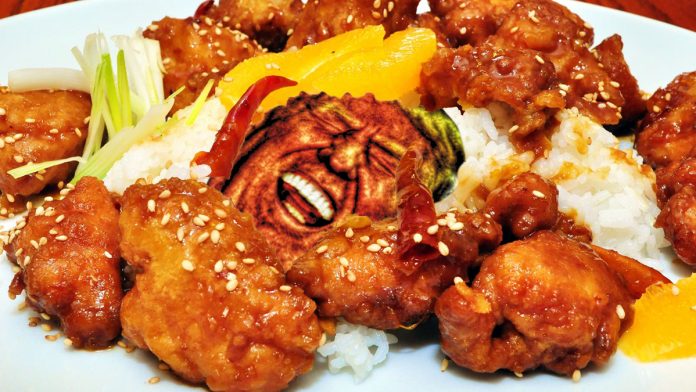Washington D.C. — As the 2024 presidential race heats up, former President Trump has returned to his favorite strategy—tariffs. This time, he’s suggesting a hefty new tariff on Orange Chicken. Yes, that tangy, sweet, pseudo-Chinese dish found in strip mall food courts from Seattle to Miami and beyond. Trump, as he made his way to a waiting limo after a rally, casually mentioned to reporters, “We’ve taxed them $50 billion on tech, another $200 billion on goods, and now, I’m thinking we hit them where it really hurts: Orange Chicken. Big time.”
His announcement was met with confusion and even panic among Orange Chicken lovers everywhere.
“We’re gonna hit China with an additional $267 billion in tariffs at the snap of my fingers, and a good chunk of that’s going right on their number one export: that delicious, crispy Orange Chicken,” Trump added while stepping into the limo without taking further questions.
This bizarre yet somehow predictable statement follows a pattern similar to Trump’s previous tariffs back in 2018 and 2019. Those trade policies were meant to protect American industries and reduce dependence on Chinese imports. Instead, they mostly succeeded in driving up prices for American consumers, and that sneaky inflation set the stage for the sticker shock people felt once the pandemic subsided.
Déjà Vu, With Extra Sauce
Trump’s earlier tariffs backfired on everything from washing machines to soybeans, but the broad strokes of his approach left few winners. Trump’s playing a political game by targeting food items like Orange Chicken, using tariffs as a thinly veiled gesture to rile up his base rather than thoughtfully protect U.S. industries.
“I don’t see how making Orange Chicken more expensive is going to help anyone,” said David Liptus, a Nevada resident who proudly consumes the dish at least twice a week from his local food court. “It’s just like last time. First, it was bacon prices through the roof because of pork tariffs, but now he’s coming after my Orange Chicken. What’s next, a tariff on my BBQ ribs?”
Experts point out that Trump’s tariffs on Chinese imports back in 2018 didn’t just hit high-tech industries—they raised prices on everyday goods, especially food. These tariffs indirectly stoked inflation, which didn’t fully manifest until after Covid, when demand for consumer goods rebounded and people began to notice how much more they were paying at the grocery store. If tariffs were the opening act of inflation, post-Covid demand was the headliner.
Orange Chicken for the Masses?
Orange Chicken has skyrocketed in popularity, dethroning Ranch Dressing as America’s favorite dipping sauce and being a staple at Panda Express outlets nationwide. “I can barely get my kids to eat anything else,” said San Jose mother of three, Patricia Kelly. “If this tariff goes through, I’m going to need a second mortgage just to feed my family. First, it was milk and eggs, now Trump’s after Orange Chicken.”
Yet, the tariffs of yesteryear should have been a warning. Instead of protecting American industries, they ended up adding costs for consumers and businesses alike while leaving a lasting impact on inflation. It’s almost as if these tariffs weren’t about economic strategy at all but more about the spectacle—using tariffs like political fireworks to stir up suspicion and frustration among Trump’s supporters.
A Trump spokesperson later clarified that while the Orange Chicken tariff isn’t final, it’s part of a broader plan to “make America great again,” one crispy chicken bite at a time.
What is Orange Chicken Anyway?
For the blissfully unaware, Orange Chicken is a popular dish served in countless North American Chinese restaurants, made of battered and fried chicken pieces coated in a sweet orange-flavored chili sauce. Over the last few years, it has captivated the American palate, becoming a staple of fast-food Chinese cuisine across the country.
With tariffs looming on the horizon, fans of the dish might soon find themselves paying more for their sweet-and-sour indulgence—if they can afford it at all.

